When Britt was still practicing as a naturopath, we watched a documentary called Chemerical: Redefining Clean for a New Generation. The takeaway message of the film is nicely polished: household cleaning products could be hazardous to your health even if stored and used properly, so it’s best to switch to all-natural products, especially ones made at home.
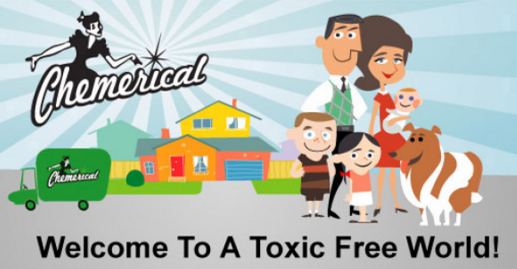
Toxic Chemicals in the House
The film is an effective piece of rhetoric because it capitalizes on the fear of bad health. My favorite example is the emotional coverage of a woman who claims to suffer from “multiple chemical sensitivity” (MCS). She states that she has been disabled since the rise in use of scented household products. She wears a mask in public, stores her money in a plastic bag, washes her clothes and hair with baking soda, makes her vet perform procedures on her dog in the parking lot, and doesn’t use any cleaner she considers artificial.
If she senses that she has been exposed to chemicals, she suffers from tremors, pain, and panic attacks. Even when the production crew of the film enter her home (after following her cleaning instructions) and having them wear scent-free ponchos, she still is “affected.” She decides it must be rental car smell lingering on the production crews’ clothing. The film uses other story lines like this one to argue that everyone could be suffering from loitering odors.
I don’t think I had heard of MCS before watching Chemerical. I vaguely remember seeing it on a piece of Britt’s naturopathic promotional material. It seems like a plausible health condition; even the notion that “off gassing” household products could be harmful seems plausible. The whole Chemerical message therefore seemed like a great idea, even if it meant considerable changes to personal hygiene and shopping habits.
Multiple Chemical Sensitivity
In writing this post, I learned that MCS isn’t really a disease caused by a reaction to chemicals. In fact, in a double-blinded, placebo controlled study, patients with MCS showed no differences to non-MCS patients when reacting to chemical exposures or placebo exposures. It’s more likely that MCS is a psycho-social condition, which is manifested as a belief that airborne chemicals in very low concentrations are causing damage.
Many naturopathic websites discuss and advertise treatments for MCS. At Pangaea Clinic of Naturopathic Medicine in Richmond, British Columbia, one suffering with MCS could be treated with the following:
- Sauna detoxification
- Intravenous vitamin C
- Oxygen therapy
- Ozone ultraviolet blood irradiation
In case you didn’t know, ozone ultraviolet blood irradiation is a process where blood is taken out of a patient to be infused with ozone gas and exposed to UV light and then reinjected back into circulation. I don’t think this “treatment” works for anything, and it sounds dangerous. I wonder if they need to tell MCS patients that ozone is a chemical.
In Naturopathic Doctors News & Review, the flagship publication of the American Association of Naturopathic Physicians, Sarah A. LoBisco, ND suggests that MCS is linked to our society’s degrading environmental health, which to her, includes contamination from industries dealing in toxic chemicals and also contamination caused by electromagnetic signals.
I get the sense that naturopathic doctors are living in an alternate universe. I can only imagine what could be on the horizon for cutting-edge naturopathic treatments for MCS:
- Phased energy blood irradiation – fixes the quantum damage to your tissues and DNA by honing in on the types of electromagnetic energies you were exposed to and reverses the damage with energies out of phase to your exposure.
(It’s actually really hard to think up of novel alternative health treatments.)
But in 2013, Britt and I didn’t know any better. The Chemerical film convinced us we should remove our “toxic” household cleaners. The film also served as a convenient marketing tool for Britt’s growing naturopathic practice in Arizona. We could implement a “chemical free” lifestyle, and she could use the experience to help patients do the same. Like in the film, we drove our hazardous waste to the county disposal center and began the process of converting our home.
DIY Laundry Detergent Recipe
I agreed to make laundry detergent. I found a recipe online, but I don’t remember from where. In writing this post now, I did another search for a recipe from Wellness Mama, which is essentially what I did. (I probably just lifted the procedure.) In addition to the purported health benefits, do-it-yourself “natural” home products are also claimed to save money.
At the time, Britt had her own naturopathic practice blog, and I promised I would write up the instructions and blog about the process and effectiveness. I took pictures and some notes, which was over one year ago already.
Ingredients:
- Two 4-5 oz. vegetable-based, clear glycerin bar of soap
- Two cups of borax
- Two cups of washing soda
Materials:
- Food processor
- Shredder blade
- Regular blade
- Measuring cup
- Large bowl
- Large mason jar (important for farm, natural chic)
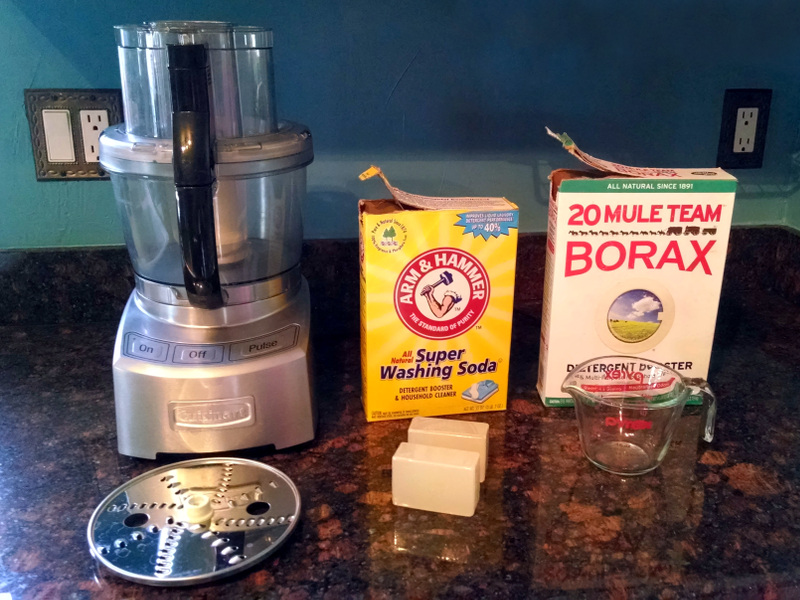
Procedure:
- Install the shredder blade in the food processor
- Shred one bar of soap
- Remove the lid and shredder blade and pour in one cup of borax and one cup of washing soda
- Reattach the shredder blade and shred the remaining bar of soap. (Note: If you have chunks of soap that did not get shredded, just cut these into pieces with a knife.)
- Remove the lid and shredder blade and add the remaining cup of borax and cup of washing soda
- If you can attach the regular blade to the bottom of the mixer without the soap and powder getting in the way, go ahead. You may need to use a wooden spoon to dislodge clumps to make room for the blade to sit at the base of the mixer. Otherwise, dump the contents into a large bowl. Attach the regular blade. Dump the mixture back into the food processor. (Note: the purpose of alternating the soap and powder is to help the even mixing of the shredded soap and powder.)
- Mix the soap and powder for about 45 seconds. Watch carefully. You will see the shreds of soap become smaller and the mixture adopt a sort of liquid property. When you notice the mixture becoming more and more viscous, stop. In my first try at making this recipe, I overmixed and the product became very sticky and undesirable. I think over mixing causes the soap to warm and to aggregate together. You want a texture that feels dry and soft with bits of soap about 2-3 mm in length.
Congratulations! You’ve made all-natural laundry detergent! You are on your way to years of healthier living and cost savings!
This recipe makes just over 5 cups of “natural” laundry detergent. If you have a high efficiency washing machine, you can use 1-2 tablespoons per load, and with this batch of detergent you should be able to do about 40-85 loads.
Performance of a “Natural” Laundry Detergent
The first thing I noticed about the mixture is that it has almost no odor. It smells neutral, if that means something to you. When mixed with water, it turns slightly opaque and does not form suds. It seems to clean very well. I tried it on a pair of dirty dog leashes in a bucket, which were rendered to a new degree of cleanliness I had not yet experienced. The run off from the bucket was best described as “nasty.”
Britt and I tried it on our first load of laundry and we were impressed with the results. The mixture fully dissolved in the soap dispenser and went into action in our high-efficiency front loader. Our clothes emerged clean and without subtle fragrance odors or what some may call a “chemical” smell. We were both satisfied. I continued to make this recipe until we moved to Germany because we no longer had a food processor.
Based on its performance, I would recommend the recipe for anyone who has the DIY bug. I would guess that the mixture cleans as well as any other commercial product.
Cost Savings?
There are reports from various blogs that using this recipe will save money. One enthusiast claims that he saves $65 per year over buying a common product like Tide. This amount of savings seems high.
I calculated that if I were to buy my ingredients from Wal-Mart (I don’t really like Wal-Mart, but oh well), I would spend $4 per batch of this recipe (55 oz. washing soda $3.97; 76 oz. Borax $3.97; bar of glycerin soap $1 [I don’t see the soap I used at Wal-Mart, but I remember each 4 oz. bar cost $1]). This means each load costs about 4.7 cents to 10 cents, depending on the amount used.
According to the price of high-efficiency Tide powder at Wal-Mart and claims that each package contains 102 loads, each laundry load with Tide would cost 17.6 cents.
According to the price of Arm & Hammer laundry powder at Wal-Mart and claims that each package contains 155 loads, each laundry load would cost 7.8 cents.
It appears that the DIY laundry recipe will save money, but this already seems highly dependent on which brand is being replaced. For that blogger to have saved $65 per year, he would have to do a lot of laundry and probably switch from a very expensive brand. If he switched from Tide, this change could be realized with over 500 loads of laundry per year!
I think it is important to note that there may be considerable cost savings by switching to a budget or generic brand rather than jumping into a DIY adventure.
Conclusions
Homemade laundry detergent is easy to make and will clean your clothes. You will notice that your clothes smell neutral, but I suppose this lack of odor might also be achieved with a scentless product as well. The recipe takes less than 10 minutes to complete, including clean-up. Your friends will respond to your DIY household products with varying degrees admiration and incredulity.
The claims that low levels of household chemicals are making people sick in their homes seems unreasonable. I have not seen warnings by public health officials regarding everyday exposures and health risks. The only exposure I have had to this health warning has come from advocates of natural living, of which naturopathic doctors have already cornered the market. You can explore with Google how NDs advertise their services for patients with multiple chemical sensitivity, heavy metal exposure, environmental toxins, etc.
It is a logical fallacy (appeal to nature) to think that things from nature are good for us or better than those made synthetically. The following things are natural but dangerous:
- Poisonous plants, animals, and fungi
- Ozone
- Uranium
- Volcanos
- Ultraviolet radiation
- Cosmic rays
- Dark matter
Chemerical does a disservice to those who are vulnerable to exploitation by health care providers who depend on the logical fallacy of appealing to nature. I suspect that most naturopaths discuss household chemicals with their patients and might refer them to the Chemerical video or website. They already recommend blood irradiation and ozone injections. Will one day they recommend dark matter enemas?
Making homemade laundry detergent was fun, but I certainly didn’t receive any health benefit.
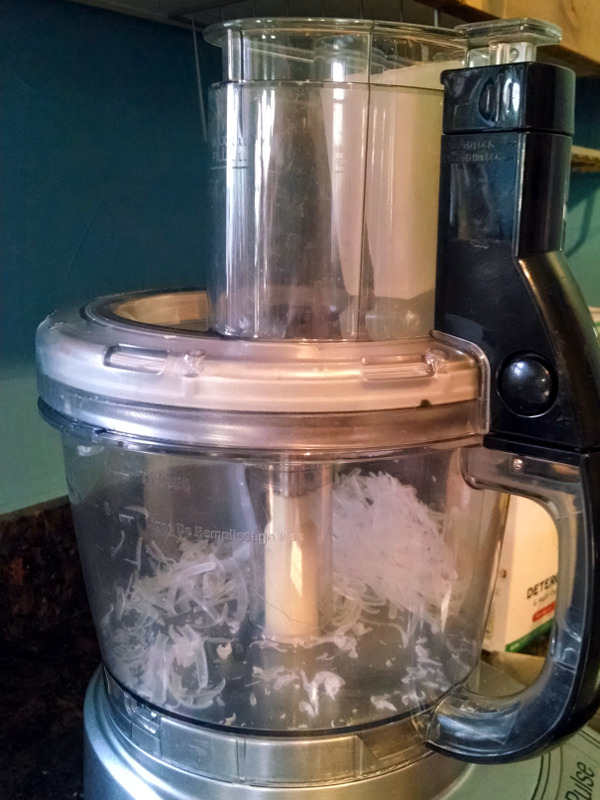
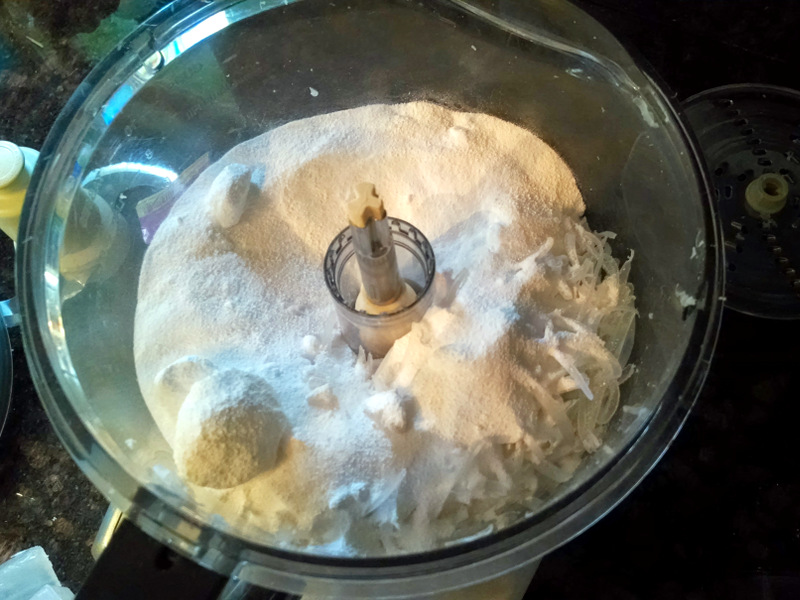
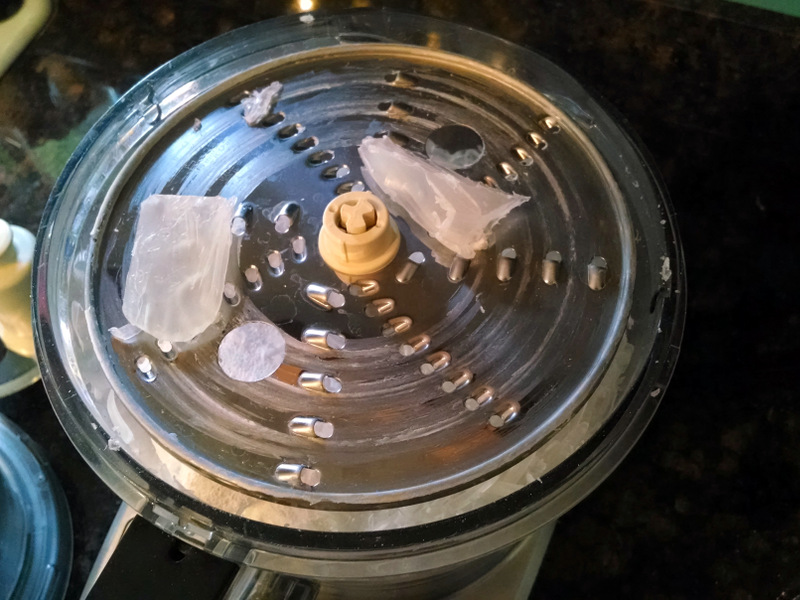
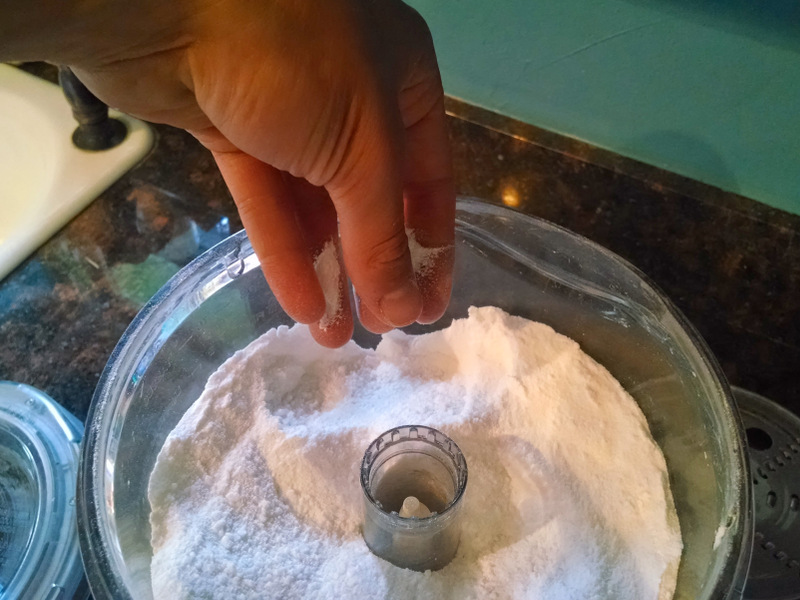
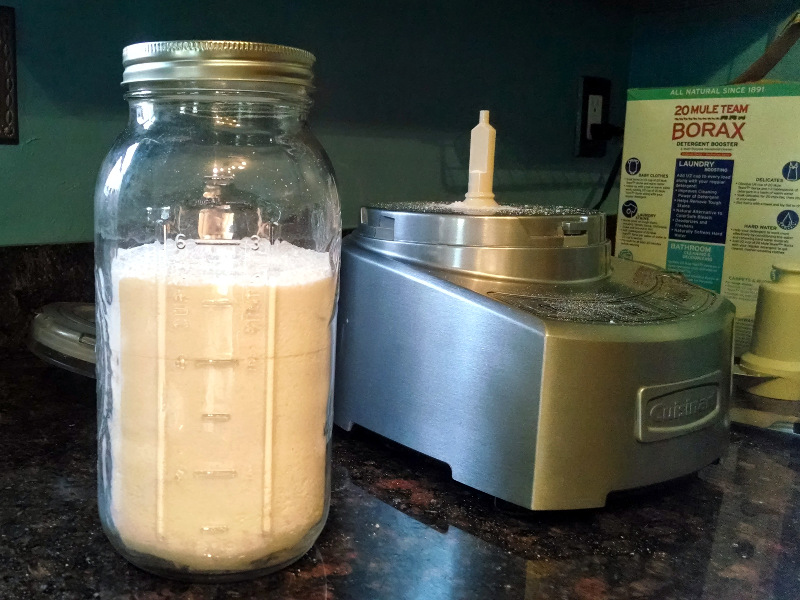
dumb
Why do you say naturopath and not naturopathic doctor or naturopathic medical doctor/physician? I thought naturopaths/ traditional naturopaths were those who did not graduate from an accredited school? Thanks!
Maybe because a naturopath is not necessarily someone with a doctorate in medicine, which can only be obtained from an accredited medical school after sufficient training and courses.
Ah. “accreditation” and “sufficient” are slippery words. I purposely do not use the phrase naturopathic “doctor” because I do not believe naturopaths are physicians, or that their education is even on par with a PhD/ doctorate. The distinction made between traditional naturopaths and naturopathic doctors is something that naturopaths graduating from “accredited” schools like Bastyr invented to provide the impression that their training is “sufficient.” However, these schools are accredited by their own accreditation board, which was founded by a former president and founder of Bastyr University. And the “sufficient” training is only considered adequate or sufficient within the circle of naturopathic medicine. No other medical field considers naturopathic training at an accredited school sufficient to practice medicine.
This ND was working with a couple of MD’s and a nurse practitioner..and when I looked up the licensure bill, there was a DO on their board of licensing or something like that. I’m not sure if I’m understanding this correctly. Is there a select few that believe that ND’s shouldn’t be called doctors? It just seems like they’ve already been incorporated within the health system.
NDs ARE doctors, thats what the ‘D’ stands for. Its only the irrelevant opinions of a minority who claim that NDs should not be called what they rightfully are. These people are mainly either pharmaceutical shills or older MDs who are threatened by how effective NDs and natural therapies are.
In any event, there are more and more MDs who are siding with NDs on various health ssues. Most are younger MDs who understand that a shift in medical paradigm is necessary. As you have seen yourself, MDs work with NDs and often co-manage cases.
I always thought the ‘D’ stood for duck. As in quack.
Well, I’m neither Jerry, and while you’re corect that naturopaths are “doctors’ to the same extent that someone with a PhD in Engish Literature or Anthropology are also doctors, the distinction being made here is that ND’s are not physicians.
I am a young doctor working in the medical field, and nowhere do I see Jerry’s shift to doctors comanaging patients with naturopaths. I would say it is the opposite. As naturopaths try to treat more things with pharmaceutical they do not understand, I find that more and more we are insisting that patients drop these quacks. We are also being more aggressive when it comes to children and involving the courts when naturopaths suggest treatments that are contradictory to evidence based medicine.
But jerry who is not a naturopath, not an md, nor a researcher will continue tout a differing opinion with zero knowledge nor evidence.
Just saw an ND the other day who was administering vaccines… I’m confused… I thought they were anti vaccines?
Yes, it’s true; just as the world of medicine is not black and white, not all naturopaths are blind to benefits of vaccines. To assume otherwise one would have to believe that extremists know everything.
Let’s say you became enamored by medicinal plants of the Amazon. Knowing that the region houses more species of plants than in most other parts of the world, you hope to find one or more with activity against some disease for no one has found a cure. Failing that, you might stumble upon an indigenous herbal medicine that could be brought to the market. You might only spend a week, but it could take longer.
Ignoring the potential of death by poisonous snakes, spiders, and creatures in the water, you would also be residing in a region where yellow fever, typhoid, and hepatitis A and B are rampant. Typhoid can be contracted just from eating the local food or drinking the water. If you thought the local shaman would have effective medicines for any one them, you would be sadly mistaken. Knowing there are vaccines for each of the diseases, a person would be a fool to go without them.
Just as not all naturopaths object to vaccines, I know that some understand their importance better than others. As for what they are taught in naturopathic schools, not being a naturopath, I would defer to Britt Hermes.
To begin to understand the value of vaccines, one has only to look up typhoid, yellow fever, and hepatitis A and B – diseases endemic to the Amazon. Typhoid can be contracted from eating the local food or drinking the water. If you were under the misguided assumption that the local shaman could take care of any one those diseases, you would be sadly mistaken.
Lighthorse, I know you have some redundant comments here due to the delay of the posting system. sorry!
Yep, that’s what happened. The last post could certainly be deleted.
Posted by Britt on behalf of Mark T.
“Many people claiming MCS also claim it started after some experience involving exposure to cleaning chemicals, which often contain powerful smells from ammonia, solvents, fragrances, etc.
In this study, about half (49%) of self-reported cases of chemical/pollution hypersensitivity were found to have dust mite allergy, which is a common allergy especially associated with stirring things up during cleaning:
http://www.ncbi.nlm.nih.gov/pubmed/12046597
For many of these people, MCS probably started because they were exposed to a powerful allergen simultaneous with being exposed to these smells. Like Pavlov’s dogs, this caused them to associate the smells with the symptoms, leading to the condition that the smells alone can provoke the symptoms. Once this becomes fixed in the mind, it can be reinforced by subsequent exposures to smells that stimulate psychosomatic symptomology. It’s a self-reinforcing feedback loop that can be difficult to break, and indeed sometimes is never broken.
And it’s made all the worse when encouraged by some pseudomedicine practitioner.”
The naturopaths can have the MCS patients. They really belong in a psychiatrist’s office, but try getting one of them to agree to that.
I have, for a long time, responded to “It’s natural!” claims with “So is poison ivy.” I also actually laughed in the face of a girl in a warehouse store touting “It has no chemicals!”
I’m glad I have discovered this diary.
I have a propensity to reply to people who extoll the wonders of their products as “It’s organic!” with “So is cyanide”
Want to really freak people out? Point out that all ‘toxins’ are ‘natural’, by definition of the word. Funny that so many people talk about ‘toxins’ without ever bothering to look it up. What else did they not verify?
Some toxins are synthetic products, in which case “natural” would not apply. One can also state that for any number of “dietary supplements”, such as medicinal plants, including those used for 100s or 1000s of years, human and animal toxicity has barely and, in many cases not been adequately established, and it is only after long-term use in the marketplace and larger clinical trials that the problems become apparent. In the case of more regulated and studied pharmaceuticals, adverse effects may only become apparent after tens of 1000s of prescriptions.
Hi, I know this is a rather late comment. I am a not-so-regular reader of the diaries, but I am mostly excited of the articles. As I am am an interested but medicine lay person I rarely feel competent to make comments here.
What drives me this time are two items:
1. In my opinion, Taylor’s post here misses one point. The homemade detergent uses at least two substances contained also in off-the-shelf washing products. Although Borax and washing soda are minerals from natural deposits, they are processed until you can buy them in a store. Therefore the distinction/dichotomy between “chemical” and “natural” fades in double respect: a) The homemade detergent is not really “natural” as well as our buyable detergents are not totally “chemical”. And b) the difference between natural or chemical is effectively floating, despite what a substance is thought to be by the “appeal to nature” adherents. (Or should we generally abandon thinking of such a “difference”?) For me these are interesting points which perfectly add to the statement of this blogpost.
2. As to Britt’s remark about “doctor” or not … From my understanding I agree to the idea, not calling naturopaths “doctors”. Maybe this idea should also find its way into the title of the Diaries?
Really bad suggestions Gus, next time dont post
By the way, I am really curious if this (obviously new) fad will make it’s way to good old Europe especially to Austria. For the unspeakable German “Heilpraktiker” it will generate new money making practices. And it will perfectly add to the “electrosensitivity” best known here…
Crazy thing in canada is that as soon as the naturopaths got an increaed scope of practice to prescribe pharmaceuticals….they were all on the first plane to California to take courses in aesthetics. So instead of prescribing the meds that they said were essential to the care of their patients, they do botox and fillers. It seems so contradictory to what I would think would be the naturopathic mentality…but I guess anythibg for a buck.
http://ptifa.com/botox-dermal-fillers-training-for-bc-naturopaths/#.VdC_69m9LCR
So, I am a DIYer and I think I will give this recipe a try. I always keep some Borax on hand to give my beets a little lift (beet plants love an extra touch of boron in the soil!) and I really like unscented laundry soaps. Will report back on this!
I’m very passionate about evidence-based medicine so I love your website.
I agree with skeptics that the MCS world is just saturated with crazy quackery and seems like a cult, but I disagree that MCS is simply a delusion.
Having MCS myself allows me to know it’s real before science does. I think the general rejection of MCS by the medical world will soon be revealed for the massive medical blunder that it is.
We can not conclude MCS is simply a delusion from a few small provocation studies.
As with many real conditions, there will be misdiagnoses, especially when the diagnosis is made by quack doctors or the patient themselves, which probably occurs with most MCS diagnoses. There may also be psycogenic MCS cases.
So it’s possible that false MCS cases are highly diluting true cases, or that there’s a selection bias for false cases, resulting in false MCS cases being studied making it appear MCS doesn’t exist.
Surprisingly, MCS is accepted by mainstream experts under another name: Mast Cell Ativation Disorders (MCAD).
Before getting on MCAD drugs, such as antihistamines, I had instant reactions to nearly all smells, including nature smells, that wiped me out for hours or days.
This condition is very real and life-ruining.
“Having MCS myself allows me to know it’s real before science does.”
You actually can’t know, as an individual, if “it’s real before science does.” The process of science is designed to remove the biases that can occur when one person thinks they know something is true. It’s a sample size of one with no external checks.
I do not doubt that you experience real symptoms. But you cannot say you know what is causing them without properly designed, blinded studies with large sample sizes and laboratory studies to elucidate the details.
Ok, I’ll concede on that strong wording of certainty.
I will say having the condition myself can give me special insight into it.
I do think many of the alternate explanations given by skeptics may be true for many cases of MCS, but not in all cases, such as mine.
My symptom onset clearly correlates with smell exposures; symptoms occur in 0-2 seconds of exposure to nearly any smell.
I can not correlate the onset, severity, or duration of my symptoms to any conscious psychological states.
If someone’s back always feels fine but they consistently get sharp back pain the instant they bend over, it’s very clear to them that the back pain is triggered by bending over. That’s how clear-cut my reactions are to smells.
And that’s absolutely all I based it on is the unmistakable correlations. I didn’t read about it online or go to some quack doctor. I had never heard of such a condition. I had no concern about smells. I had no reason to expect to start reacting to nearly all smells that others, including my former self, tolerate just fine. It was very surprising to me.
I don’t expect to convince most people with an anecdote. I just wanted people to know that not all MCS cases are the same. A few small provocation trials says nothing about my case or other cases not in the trials.
False cases of MCS should be expected, but it’s also very hard to do indisputable blinded provocation trials for MCS.